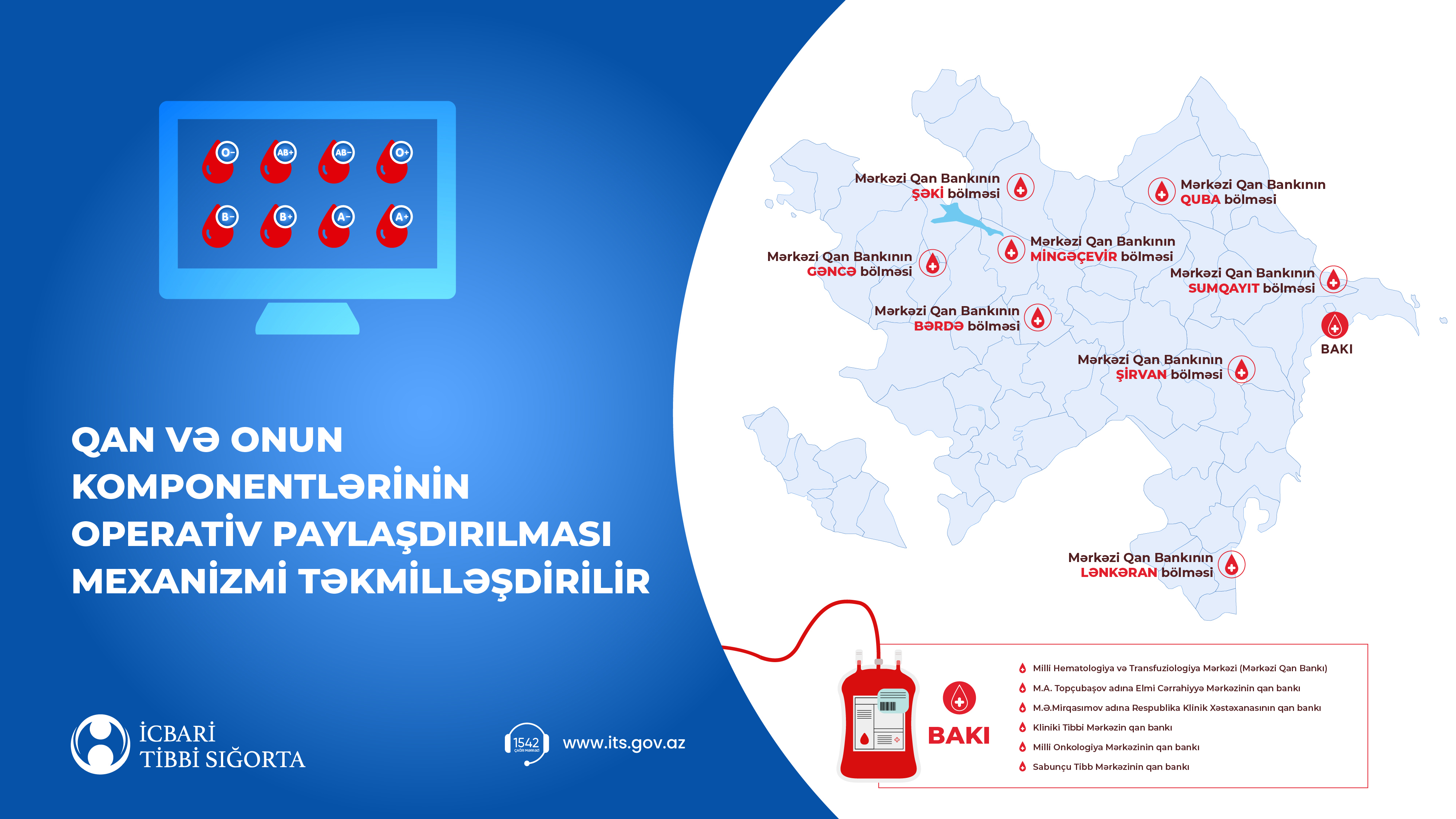15 Dekabr 2022 15:00
Qan və onun komponentlərinin operativ paylaşdırılması mexanizmi təkmilləşdirilir
İcbari Tibbi Sığorta üzrə Dövlət Agentliyi tərəfindən Xəstəxana İdarəetmə Sisteminin “Mərkəzi Qan Bankı” modulu istifadəyə verilib. Modul qan tədarükü zəncirini gücləndirmək, ehtiyacı olan şəxslərin qan və onun komponentləri ilə təminatını yaxşılaşdırmaq məqsədi ilə yaradılıb.
Bu modul özündə bütün donorların reyestrini cəmləşdirərək donorların düzgün statistikasını formalaşdırır və lazım olduqda qan və onun komponentlərinin müvafiq xəstəxanalara paylaşdırılması mexanizmini tənzimləyir.
İlkin mərhələdə modulun tətbiqinə Milli Hematologiya və Transfuziologiya Mərkəzində (Mərkəzi Qan Bankı) və onun nəzdindəki 8 regional Mərkəzi Qan Bankının bölməsində (Sumqayıt, Gəncə, Şəki, Mingəçevir, Bərdə, Şirvan, Quba və Lənkəran) eyni zamanda Bakı şəhərində yerləşən 5 dövlət xəstəxanasında (Akademik M.Ə.Mirqasımov adına Respublika Klinik Xəstəxanası, Kliniki Tibbi Mərkəz, Akademik M.A.Topçubaşov adına Elmi Cərrahiyyə Mərkəzi, Sabunçu Tibb Mərkəzi və Milli Onkologiya Mərkəzi) başlanılıb. Modul vasitəsilə sözügedən tibb müəssisələri arasında qanın paylanılmasının mərkəzləşdirilmiş qaydada həyata keçirilməsi təmin edilir.
Donor olmaq istəyən şəxsin modulda qeydiyyatı şəxsiyyət vəsiqəsinin FİN koduna əsasən aparılır. Qanın və onun komponentlərinin təhlükəsizliyinin və keyfiyyətinin təmin edilməsi məqsədilə donora keçirdiyi və ya hazırkı xəstəlikləri, ona vurulmuş peyvəndlər, həmçinin narkotik vasitələr və psixotrop maddələr qəbul edib-etməməsi və digər suallar ünvanlanır. Daha sonra donorun fiziki müayinəsi aparılır, çəkisi, boyu, nəbzi, qan təzyiqi və hərarəti ölçülür. Qanın laborator müayinəsi zamanı hemoqlobinin səviyyəsi, qan qrupu, rezus mənsubiyyəti, qanda trombositlərin sayı (bu müayinə yalnız aferez trombosit donorluğunda aparılır) və alt qan qrupları təyin edilir. Laborator şəraitdə donorun qanı İİV (İnsanın İmmunçatışmazlığı Virusu), hepatit B və C virusları, sifilis xəstəlikləri üzrə yeni quraşdırılmış tam avtomatlaşdırılmış cihazda yoxlanılır. Donora verilən sualların cavabları və fiziki müayinənin nəticələri elektron məlumat bazasına daxil edilir.
Modulda qan qrupları və alt qan qrupları üzrə filtrasiya (çeşidləmə) funksiyası var. Bu funksiya Mərkəzi Qan Bankının istənilən bölməsi tərəfindən resipiyent üçün uyğun qan komponentlərinin operativ tapılmasına, vaxtında tibbi xidmətin göstərilməsinə, nəticədə insan həyatının xilas olunmasına və sağlamlığının bərpasına imkan yaradır. Modulun digər bir üstünlüyü istifadə tarixi bitmiş qan komponentlərinin proqram tərəfindən avtomatik müəyyən edilərək istifadədən kənarlaşdırmasıdır.
Eyni zamanda ilk dəfə Mərkəzi Qan Bankının laboratoriyasında Laboratoriya İdarə Sistemi (LİS) vasitəsilə tam avtomatlaşdırılmış avadanlıqlarda icra olunan donorun bütün analizlərinin nəticələri avtomatik olaraq proqrama ötürülür. Bu isə öz növbəsində yanlış nəticələrin və texniki səhvlərin qarşısını alır.
Qeyd edək ki, moduldan istifadə qaydaları ilə bağlı müvafiq tibb müəssisələrinin əməkdaşlarına təlimlər keçirilib.
Xəbərlər
İcbari tibbi sığorta ilə 182 000-dən artıq doğuş aparılıb
16 İyul 2024 11:10
Diz oynağının endoprotezləşməsində İsveçrə istehsalı protezlərdən istifadə olunur
12 İyul 2024 10:42
Kəskin orta otitin cərrahi müalicəsi icbari tibbi sığorta ilə qarşılanır
09 İyul 2024 11:11
Tiroidektomiya əməliyyatı icbari tibbi sığorta ilə ödənişsizdir
05 İyul 2024 10:25
İcbari tibbi sığorta ilə qasıq yırtığı açıq və laparoskopik üsulla bərpa olunur
01 İyul 2024 15:18
İcbari Tibbi Sığorta üzrə Dövlət Agentliyinin nümayəndə heyəti Yaponiyaya işgüzar səfər edib
28 İyun 2024 10:51
İcbari tibbi sığorta ilə 540 splenektomiya əməliyyatı icra olunub
24 İyun 2024 14:52
Zaur Əliyev Goranboy şəhərində vətəndaşları qəbul edib
21 İyun 2024 17:00
İcbari tibbi sığorta uşaqlığın çıxarılması əməliyyatını qarşılayır
21 İyun 2024 10:57
Agentlik, TƏBİB və Ankara Universiteti üçtərəfli anlaşma memorandumu imzaladı
14 İyun 2024 14:49










